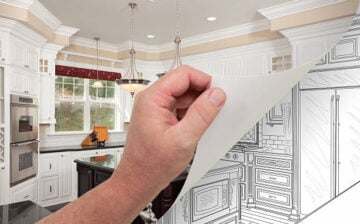Introduction
You have read books, watched mortgage shows, and even contacted the best online mortgage lenders for advice. You are ready to buy your first house—After all, you have been saving for years.
But wait! Do you know what you need to do before purchasing a home? Invest in some logical groundwork. To ease the process, here are five things you must have before buying your first house.
Prepare a Budget
First, know how much home you can afford to set your budget. Best online mortgage lenders have mortgage affordability calculators. Use them to know how much mortgage you can qualify for and your expected monthly mortgage payments. The calculations are based on your income, available down payment, loan terms, and interest rates.
Local mortgage lenders want assurance that you’ll afford to service your loan. The criterion they use is your debt to income (DTI) ratio. You should have a DTI ratio of 36% after including your monthly mortgage payments. However, lenders require a maximum DTI ratio of 43%. To calculate your DTI ratio, divide your total monthly debt payments by pre-tax monthly income.
For instance, if your pretax monthly income is $8000, with recurring monthly expenses of $2000—your DTI ratio is 25%. With a low DTI, you will get a mortgage with favorable interest rates.
To lower your DTI ratio, pay down your credit balances, and if possible, pay off your installment loans like auto loans to relieve your monthly obligations.
In your budget, include other costs of homeownership like repairs and maintenance, homeowner insurance, and property taxes. Some local mortgage lenders want to see two months’ reserve for these expenses. Be careful not to go over your spending limit.
Save a down payment
You’ll need to make a minimum down payment of the purchase price to your mortgage lender. Lenders will have varying minimum down payment requirements depending on the type of mortgage you take up. With a good credit score, you can check on the best mortgage lenders for high credit scores to pick one that offers the mortgage option that best suits you.
For a conventional mortgage, you’ll need 20% down. A lower percentage is possible, but you’ll have to pay private mortgage insurance—which you pay until you’ve 20% equity in your home to get rid off.
To qualify for a Federal Housing Administration (FHA) backed mortgage, you’ll need a down payment of 3.5% (purchase price) with a 580+ credit score. For lower credit scores (500+), you’ll need to put 10% down. But you’ll have to pay for mortgage insurance premiums—it is the only way the government cushions lenders if you default.
With Veteran Affairs (VA) and United States Department of Agriculture (USDA) mortgages, you don’t need a down payment—the lender finances 100% of the purchase price.
So if possible, try saving up a larger down payment when purchasing your first home so that you don’t have too much debt hanging over your head after closing.
Set preferences—Know What You Want
After knowing your buying capability, define the home you are looking for. To begin with, choose the type of home you want. Is it a single family home, a multifamily home (duplex, triplex or quadruplex), a condominium, or a townhouse?
Next, define your locality in terms of appearance, traffic, noise level, safety, security, parking, zoning regulations and even pet restrictions. Also, think of what you desire in schools, recreational parks, public transport, hospitals and restaurants.
Down to the home itself, know the square footage, number of bedrooms and bathrooms, garage backyard space, just to mention a few. Try to make your home a reflection of who you are as much as possible. Having knowledge about these factors beforehand helps reduce confusion later on when looking through listings online or visiting open houses.
The goal is to find a property that works well for both the short and long term—areas trending upward economically and demographically with low crime rates will be lucrative if you wish to resale in the future.
Find an Experienced Realtor
A real estate agent can help you find a home that best meets your needs and negotiate the best price. It is not a requirement to hire a realtor, however, engaging one will make your home buying process blissful.
Real estate agents are experts in their local markets. They understand the dynamics of where to find the right home using different strategies, including the Multiple Listing service (MLS). Also, they can help you navigate the complicated paperwork in real estate transactions.
To hire the best, get referrals from family and friends, read their online reviews. Interview them and select one that has expertise in the type of home you are looking for with a deep knowledge of your desired neighborhood.
Recruit a realtor early in the buying process to make them understand your expectations, budget, and what your ideal home looks like. The best part is they don’t cost you a dime! They earn their commission from the seller.
Find a Local Mortgage Lender and Get Pre-approved
By now, you have a bit of knowledge of the mortgage options you can choose from depending on your credit score. Pull up your sleeves and start scouting for lenders. This is any financial institution (a bank or credit union) that will issue you with a mortgage loan. If you are looking for an online application process, then search for the best online mortgage lenders.
To choose the best local mortgage lender shop around. Get a good number of online quotes and contact the most competitive lenders to evaluate them personally. A lender with lower interest rates, closing costs and other fees will save you money upfront and in the loan period. Also, one who is responsive with a quick application process will make your borrowing process less bumpy.
Once you have your best pick, get pre–approved. Don’t confuse this with a pre-qualification. With a pre-qualification, the lender uses your income, debt, and asset information to give you an estimate of how much you may borrow. On the other hand, in a pre–approval, the lender extensively scrutinizes your financial history and stability to inform you the exact loan amount they are willing to underwrite. Get your pre-approval letter—it is the only way sellers and realtors will take you seriously.
Now, You’re Ready for House Hunting
Purchasing your first home is a big deal. It can be stressful, exciting and even scary! To avoid common pitfalls, make a budget, have money for the down payment, list what you want in a home, and engage a realtor. Most importantly, shop for the best online mortgage lenders and get pre–approved. Buying your first house is a crucial milestone, so stay positive and enjoy every minute of this exciting time!
We hope you found this blog post on 5 Must-Haves If You’re Looking To Purchase Your First Home, useful. Be sure to check out our post on How to Choose a Good Realtor: Major Client Misconceptions for more great tips!
Have Experience in the Moving Industry? Want an Additional Income Stream? Work With All Around Moving!
If you are interested in applying your skills in the moving industry, check out our program to earn extra income. Click here to learn more.






